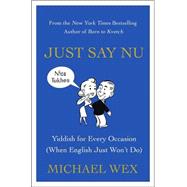
Note: Supplemental materials are not guaranteed with Rental or Used book purchases.
Purchase Benefits
--NY Times
“This is not your bubbe’s—or Leo Rosten’s—Yiddish. Translator, novelist and performer Wex follows his witty and erudite Born to Kvetch with a colorful, uncensored guide to the idiomatic, use of Yiddish in such areas as “madness, fury and driving.” Wex’s advice on the complex usage of these words can help even the greenest Yiddish speaker.”
--Publisher’s Weekly
Praise for BORN TO KVETCH:
The New copy of this book will include any supplemental materials advertised. Please check the title of the book to determine if it should include any access cards, study guides, lab manuals, CDs, etc.
The Used, Rental and eBook copies of this book are not guaranteed to include any supplemental materials. Typically, only the book itself is included. This is true even if the title states it includes any access cards, study guides, lab manuals, CDs, etc.